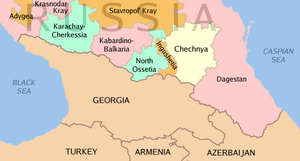Insurgency in Ingushetia
| War in Ingushetia | |||||||
|---|---|---|---|---|---|---|---|
| Part of the Second Chechen War and North Caucasus Insurgency | |||||||
 |
|||||||
|
|||||||
| Belligerents | |||||||
|
|||||||
| Commanders and leaders | |||||||
|
|
Ilyas Gorchkhanov † Akhmed Yevloyev (POW) Said Buryatsky † Arthur Getagazhev † |
||||||
| Casualties and losses | |||||||
| 400 policemen killed (2005–2010) 93 security forces killed (2010–2014) |
182 killed (2010–2014) | ||||||
| 800 killed overall between 2002 and November 2008 71 civilians killed (2010–2014) |
|||||||
Russian and Georgian victory
The War in Ingushetia began in 2007 as an escalation of an insurgency in Ingushetia connected to the separatist conflict in Chechnya. The conflict has been described as a civil war by local human rights activists and opposition politicians; others have referred to it as an uprising. By mid-2009 Ingushetia had surpassed Chechnya as the most violent of the North Caucasus republics. However, by 2015 the insurgency in the Republic had greatly weakened, and the casualty toll declined substantially in the intervening years.
On 26 July 2007, a massive security operation was launched in Ingushetia, sparked by a series of attacks including an assassination attempt on President Murat Zyazikov five days earlier. Moscow sent in an additional 2,500 MVD troops, almost tripling the number of special forces in Ingushetia. In the next few days, hundreds of men were rounded up in the sweeps, while several security officers were killed and wounded in the continued attacks. By October 2007, police and security forces in Ingushetia were issued orders to stop informing the media of any "incidents of a terrorist nature."
In 2008, Magomed Yevloyev, owner of the highly critical opposition website Ingushetia.ru, was killed while in police custody. The aftermath of the killing was marked by an upsurge in separatist activity and animosity towards Russia and Russians among the Ingush population. At the center of this controversy was the deeply unpopular President Murat Zyazikov, a former KGB general who was criticized both by human rights groups and by some in the Russian government. The Ingush Interior Minister Musa Medov was targeted by a suicide bomber in October 2008. Eventually, Zyazikov was asked to resign. On 30 October 2008, Russian president Dmitry Medvedev signed a decree to remove Zyazikov from office and replace him with Lieutenant Colonel Yunus-bek Yevkurov. This was hailed by the Ingush opposition as a victory.
...
Wikipedia
